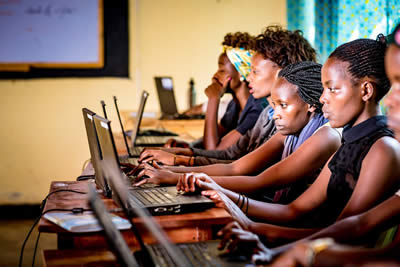In the wake of increasing migrant and refugee flows, entrepreneurship is increasingly viewed as an effective approach to overcoming some of the challenges of economic access and social inclusion.
Migrant and refugee entrepreneurship offers significant opportunities for both destination and origin countries, in terms of the potential for economic growth, but also for promoting safe, regular and orderly migration and changing societal perceptions around immigrants and refugees, respecting their different status and modalities of economic access.
Despite the challenges, efforts to support entrepreneurial activity by (and for) refugees and migrants are making meaningful contributions to the wellbeing of refugees and migrants, as well as having broader positive social impacts. Supporting migrant and refugee entrepreneurship therefore has the potential to deliver shared benefits for both foreign-born and native-born populations.
Objective
The overall objective of the project is to strengthen the capacities of governments to support the long-term social and economic inclusion of refugees and migrants and enhance their positive economic and development impact on host countries.
To achieve such purposes, countries have been selected based on governments' requests for UNCTAD technical assistance to promote entrepreneurship development in their countries and deal with issues related to vulnerable groups.
Three countries have been selected from three different geographical regions (East Africa, the Andean region and the Middle East) with a view of maximizing the impact of the project in terms of geographical coverage. Additional activities are envisaged in neighboring countries for bilateral actions and at the respective regional level.
Project Activities
Phase 1: The endorsement of the Policy Guide on Entrepreneurship and Migration at the International Level: In partnership with UNHCR and IOM, UNCTAD raises awareness on the Policy Guide at regional and international events. In partnership with UNITAR, UNCTAD develops an e-learning course in English, Spanish and Arabic to help policymakers and other stakeholders follow self-pace training.
Phase 2: Development and Implementation of action plans and capacity building workshops in beneficiary countries: National level assessment studies and workshops in Ecuador and Uganda followed with action plans to promote migrant and refugee entrepreneurship. UNCTAD’s flagship Empretec trainings in Uganda. Ecuador, Jordan, Peru, Rwanda and Turkey to a mix group of migrants, refugees and local entrepreneurs.
Phase 3: The regional collaboration and experience sharing of the lessons at bilateral level: Two regional-level workshops in East Africa and Andean region to share experiences and lessons learned among policymakers and other stakeholders.
Intended Outcomes
At least 90% of policy makers and relevant international stakeholders attending the expert meeting in Geneva confirming better understanding of policy tools and provisions for migrant and refugee entrepreneurship
At least 5 policy recommendations on entrepreneurship for refugees and migrations endorsed in international settings as a consequence of the adoption of the UNCTAD/IOM/UNHCR Policy Guidelines at the Expert Meeting in Geneva by experts who got familiar with the policy guidelines. This includes the forthcoming Global Compact on Refugees; Global Compact on Safe, Orderly and Regular Migration; UN General Assembly Resolution on Entrepreneurship for Sustainable Development; Report on the implementation of the New York Declaration for Refugees and Migrants, adopted in September 2016 by the UN General Assembly (decision 70/539).
At least 100 start-ups created by refugees and migrants in Uganda, Ecuador and Jordan, after having participated in training workshops in the three selected countries. At least 30% of start-ups are created by women.
At least 6 policy measures inspired by the Entrepreneurship Policy Guide recommendations on refugee and migrant entrepreneurship revised or introduced at a national level (3 in Ecuador and 3 in Uganda)
Link to SDGs
Following up on the New York Declaration and on the mandate provided by paragraphs 76w and 76aa of the Nairobi Maafikiano, this project would contribute to the attainment of several SDGs. Its primary impact would be on SDG 1 (End poverty in all its forms everywhere), by putting forward entrepreneurship as a means for migrants, including those in situations of vulnerability, and for refugees, to improve in different ways their economic situation according to their status, and by strengthening the economic and development contribution of migrants and refugees to host countries. The initiative could also yield positive impact on SDG 4 (Ensure inclusive and equitable quality education), through, for example, relevant educational programmes and entrepreneurship and vocational training initiatives among migrants and refugees; SDG 8 (Promote decent work for all), by protecting labour rights and promoting safe and secure working environments for refugees and migrants, in particular women and those in precarious employment; and SDG 10 (Reduce inequality within and among countries), by providing options for the improvement of economic access and social inclusion of migrants and refugees in host countries.
Monitoring and Evaluation
Monitoring will use a combination of quantitative and qualitative techniques, including in depth interviews with end beneficiaries, project team meetings and annual reports to UNCTAD’s Technical Cooperation Section
and national stakeholders on the progress of implementation of activities and achievement of indicators.
The monitoring of gender mainstreaming throughout the project activities will be ensured by fostering inclusive participation of women and men. Surveys are expected to provide gender disaggregated information, whenever possible.
The calendar of annual reports is illustrated as follows:
- By 31 January 2019: 1st Annual Progress Report presenting adaptations to national context
- By 31 January 2020: 2nd Annual Progress Report
- By 31 January 2021: 3rd Annual Progress Report
- By end of February 2022: Final Report and External Evaluation Report

